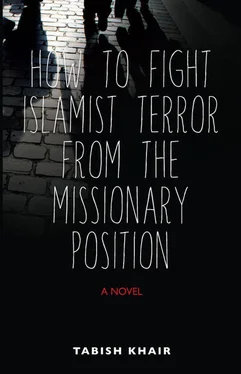I fetched two Tuborgs—only ordinary Danish beers were on offer—from the counter and joined Ravi at a corner table. It was a dark corner. The two men staring at us from the counter went back to contemplating the mysteries of what was definitely their tenth or twelfth glass of beer.
“No more,” I said to Ravi, “I am not going on one of these dates ever again.”
“So soon, bastard,” drawled Ravi, “you give up so bloody soon. How many have you dated: three, four, five? Look at me, I am on number seventy-nine: I am getting there. Any day now I will strike gold: the one girl out of a hundred in Århus who doesn’t date only white men or only colored men. That will be history! Tales will be told of us in the annals of this city. People will rank us with Frederick Douglass and Martin Luther King. Don’t throw up your spade, bastard; keep digging.
“Actually,” he added, “I was not averse to playing some ball games with Miss Spiky Hair, but the urgency of your weak-kneed knocks made me abandon the idea. What is it that repelled you, O Worshipper of Shallow Beauty, about Miss Monroe in extra size? I thought she was just up your alley and was quite convinced, until you knocked, that you would be up her alley tonight, incurring the sleepless, unspoken wrath of good old Karim Bhai.”
“She only dates colored men,” I replied.
“Good for her! All the more reason to do your duty: I have never understood what you have against that nineteen percent of the female population here. She likes colored men: good. You are colored: good. So go ahead, bastard, prove to her that you are a fucking man.”
“Don’t be more facetious than usual, Ravi.”
“You know, you bloody wog, you are going the way of all these bloody niggers. There was a time when they came to Europe, flaunted the invisible chains of slavery in the face of white women, hyped up natural rhythm and the animal in man, and merrily spiked the entire lot before white men could even clear their throats to object. White women dangled from their proverbially big dicks, desperate for redemption. Now my nigger friends get all intellectual and sensitive, point out uninteresting facts like the normality of their dicks, and lose white women to, horror of horrors, limpid white men. And it is the same with us wogs: there was a time when we floated around on our magic carpets of mysticism, bestowing our largesse with typical Oriental abundance. Sri Aurobindo had his share of Mas, Nehru netted Edwina, Bapu had a surfeit of admiring blonde Bais, Behns… Then comes our generation, claiming to be rational, doing engineering, computers and medicine; medicine, good lord! Shit, man, what’s wrong with us? Why can’t we use the few fucking advantages history has left us with?”
Ravi had raised his voice during this harangue, and one of the starers at the counter turned to frown at us. Ravi frowned back.
Medicine was Ravi’s weak point. He hated the field with a vengeance. He claimed it had to do with his dad, a legendary Mumbai surgeon, and the final fight that the two of them had when Ravi quit medical college in the third year and started doing a degree in the humanities. The university gold medal he got for his master’s in history had been scorned by his father. His subsequent diploma in journalism had not helped either. Or his aspiration to write a novel. Since then, they had only communicated through Ravi’s mother, though recently relations had thawed slightly. Ravi’s decision—after an abandoned career as a staff reporter and no evidence of a published novel—to do a PhD abroad (though still in history, which is what he was doing in Århus), had been more acceptable to his father.
I knew that the volume of his harangue would increase if he got started on medicine, as would his pugilistic tendency to take any objecting middle-aged man as a stand-in for his father. I steered him gently out of the pub, all four customers at the counter staring at us, and into the streets. They were probably safe now: there was a good chance our ex-dates had gone home.
When we returned to the flat that night, well after midnight, there was a note from Karim on the kitchen table. “Salaam- alai-kum. Night shift today; will be back for breakfast,” it said. Karim Bhai was very conscientious. He seldom left the flat without leaving a note for us. He kept a list of “supplies to be bought” hanging from a magnet on the fridge, and diligently crossed items out or added them in his neat handwriting. If he expected something similar from us, he bravely kept his disappointment from showing.
The next morning, I woke up expecting a call from my parents in Karachi. It was Saturday; they called every Saturday morning. I was waiting for the chirr of the phone while taking out cartons of milk and juice from the fridge and toasting bread. The coffee machine gurgled. Ravi was traversing the lobby, wrapped in a towel on his way out of the shower, and he picked up the phone when it rang. I expected him to hand it to me, but he continued talking into the receiver.
It soon became obvious that the caller was not one of my parents. It was someone doing tabligh: trying to preach the virtues of the Quran. Perhaps it was someone known to Karim. Perhaps he thought Ravi was Karim. I had heard of these phonic proselytizers, but never experienced one—and I wondered, for the person evidently spoke Urdu, if the call was not from India or Pakistan. In any case, the number was a secret one; it did not show on our phone.
Talking about the Quran was not an issue for Ravi, but the secrecy of the number perturbed the democratic Indian in him. Between questions and answers about the Quran, of which he probably knew as much as the anonymous proselytizer, Ravi kept querying him about his identity and the need to use a number that did not show.
I signaled to Ravi to cut the connection; I am expecting a call, I mouthed at him. He ignored me and continued to discuss some fine point of Quranic exegesis.
I wrenched the receiver away from him. He would have resisted but for the fact that he was still clad in a precariously knotted towel, which had to be kept in place with one hand.
“Hello, hello,” said the voice on the other end. Then it continued in chaste Urdu, “As the Quran Sharif says in its infinite wisdom…”
“Excuse me,” I said, in chaste Urdu too, “the connection is extremely bad. I cannot hear you very well.”
There was a bit of beeping. The guy evidently had a team working on the technology. Volume and audibility increased.
“Is it better now?” the anonymous proselytizer asked.
“Hello, hello,” I replied. “I cannot hear you…”
“Just a second, janaab. Don’t put down the phone.”
“Hello,” I said, “hello, hello, hello…” I put the receiver down.
The phone rang again in two seconds.
I put it down once more with a string of strangulated hellos. Ravi came out of his room, buttoning his jeans, bare-chested.
He shook his head.
“You, my friend, are the reason why the infidels are winning,” he said.
After a slow breakfast, he diligently practiced the postures of prayer that Karim Bhai was teaching him. He ignored my comment about it being symbolic compensation for the disappointments of last night.
When we finally left for the university library around noon, Karim Bhai had not returned despite his note of the previous evening.
By three in the afternoon, Ravi had abandoned the library building, ambitiously shaped to resemble a book from the outside, though the resemblance was more imaginary than architectural, and SMS-ed a rendezvous with one of his “plain” girlfriends. Ravi was a restless researcher: this did not show in his work or erudition, which was sustained by a consciously camouflaged ability to read and absorb faster than anyone else I have known. He must have been obnoxious as a school student. I would have hated going to the same class as him, for I came to my education through diligence and perseverance. Ravi tried to make light of this difference on the occasions I brought it up, pointing out the fact that while I was being taught English, Urdu and a faint smattering of French by my Jesuits in Karachi, he was being taught English, Hindi and French by his Jesuits, as well as Sanskrit, Latin, Gesrman and the piano by a succession of private tutors employed by his parents.
Читать дальше












